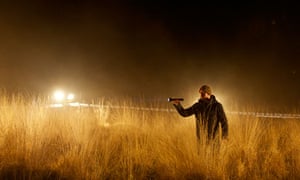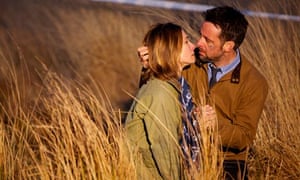(The Guardian chronicle on Hinterland)
Hinterland – the TV noir so good they made it twice
As if it wasn't hard enough filming a harrowing detective drama in the freezing wilds of Wales, the makers of Hinterland did it all twice – once in Welsh and once in English. Stephen Moss spends a day on set
Will Welsh thriller Hinterland be the next Netflix hit?
Will Welsh thriller Hinterland be the next Netflix hit?

It's a gorgeous summer evening on the coast of Wales. As the sun sinks gently over the marshes, the birds are singing and a horse is munching happily in a field. All is well with the world – until you notice a body in the long grass, propped up on its knees as if praying. And suddenly we've plunged into the dark heart of Aberystwyth.
This is the shoot for Hinterland, a new Welsh detective series that aims to do for this bit of Wales what Wallander did for southern Sweden and The Killing did for Copenhagen. The cast and crew have worked all through the winter, sometimes in conditions so cold the actors could hardly speak. While making four 90-minute films back to back was never going to be easy, what made it even tougher was that they had to shoot speaking scenes twice – once in English, once in Welsh – as Hinterland will be shown on both S4C and the BBC in two different versions. No wonder Richard Harrington, playing the brooding central character, DCI Tom Mathias, looks so knackered. He's only had only one day off during the 124-day shoot.
Mathias, as is the way with the new breed of detectives, is intense, troubled and searching for redemption. There are echoes not just of Scandi-noir here, but of Broadchurch and The Fall – even though those two British series had not yet been aired when Hinterland started filming. These days, it seems, all TV cops have to suffer, the grimness of what they investigate inevitably leaving its mark. "There's a presence in what you're uncovering," says Harrington. "A menace, a malice. It's all the shit and dregs of what we are like as human beings."
Harrington and his co-star, Mali Harries, who plays DS Mared Rhys, spent time with local detectives to get a feel for their work. "The policemen said getting hold of the truth was the most important thing," says Harries. "In every film, we are striving to differentiate between truth and lies – to get hold of the truth and forget the lies."
Some of these detectives worked on the April Jones murder inquiry. Jones lived in Machynlleth, close to Aberystwyth. When I visited the town, the esplanade was still festooned with forlorn pink ribbons, put there by locals desperately hoping the five-year-old would be found. She never was, and the end of filming coincided with Mark Bridger being found guilty of her murder. Sometimes fact outruns even the most gruesome fiction.
"We dealt with the CID who had just interviewed Bridger," says Harrington. "You could tell they had been affected by it. All they wanted from this man was the truth. I felt they were good people trying to do something worthwhile." It's a thought the actors want to carry into their roles. "If you aren't affected by trying to find killers, there's something wrong with you," says Harries. "Every character has to be changed by what they've experienced, and should end in a different place from where they began. The jump between the beginning of the first film and the end of the fourth is massive."

Hinterland – which, in something of a coup, has already been sold to DR, the Danish broadcaster behind The Killing – was created by Ed Thomas, an award-winning playwright and creative director at Cardiff-based film company Fiction Factory. The series, which cost £4.2m, is a huge undertaking for both Fiction Factory and S4C. "It took two and a half years to raise the finance," says Thomas. "The project was dead on more than one occasion. It took far longer than I hoped, but looking back, I think it was a real achievement even to get to the starting line." And it was no picnic once they were off, either: "The weather was brutal and the budget was tight. We had to keep the plates spinning through many months of freezing weather."
Shooting in two languages has proved an extra headache. "It's absurd in some ways," says Ed Talfan, writer and co-producer. "But in a strange way, you get to know each scene better because you spend longer with it. Sometimes the actors like the process for that reason, but there are other days when you just want to see the back of a certain scene – and think, 'Oh Christ, we have to go again and shoot it in another language.'"
They shoot in English first: not all the crew speak Welsh, so doing it this way helps them feel more conversant with a scene. Welsh is a sparer language, which presented the odd problem. "Scenes can end a lot quicker in Welsh," says Harrington, "and because it's more poetic and colourful, you can say some things with a word or even a look. You can't try to do exactly in Welsh what you did in English."
"They are different films," says Thomas. "Even though they are literal translations, they have different strengths and nuances." Broadly speaking, the mythic power of Welsh is great for scenes set in the timeless landscapes, while the concreteness of English suits police procedural. Thomas hopes that when the DVD appears, it will include both versions. As with subtitled Scandi-noirs, the Welsh incarnation might actually prove a cult hit with English audiences.
The key to Hinterland is the landscape: beautiful, forbidding and secretive, it becomes a character in its own right. "The sense of place is crucial," says Talfan. "It feels like a part of the UK that is untapped and undiscovered." Thomas adds: "It's a part of Wales that had not been photographed, a sort of last place somewhere in the northern part of Europe that people don't know much about – a hinterland rich in history and myth."
Is there a danger that – using the now-standard tropes of a strong sense of place, a dysfunctional detective, a haunting soundtrack and brutal crimes – the series will be seen as just another exercise in noir? "We won't be the only people with a detective who is a troubled outsider or an ex-alcoholic or has had a broken marriage," says Thomas. "They're all cliches. It's what you do with the cliches that matters. We've put an outsider in the middle of this place. We see it from his point of view, and use the crime genre to tell stories about a forgotten part of northern Europe." He makes great play of the fact that, unlike The Killing and Broadchurch, these are four standalone films. "Each has its own texture and feel," he says, "but tonally they belong to whatever we think Hinterland is."
Is the public appetite for noir infinite? "I hope it is," laughs Thomas. "It might be that our timing is a year too late, but I can't do anything about that." The key thing, he insists, is that they didn't set out with a formula in mind. "I'd much prefer to belong to something that was intuitively thrown together, rather than something over-designed. People might think it's just another old detective story, but they might also share our surprise – at finding this unknown hinterland."
• Hinterland will be shown on S4C later this year and on BBC Wales and BBC4 in 2014.
Sem comentários:
Enviar um comentário